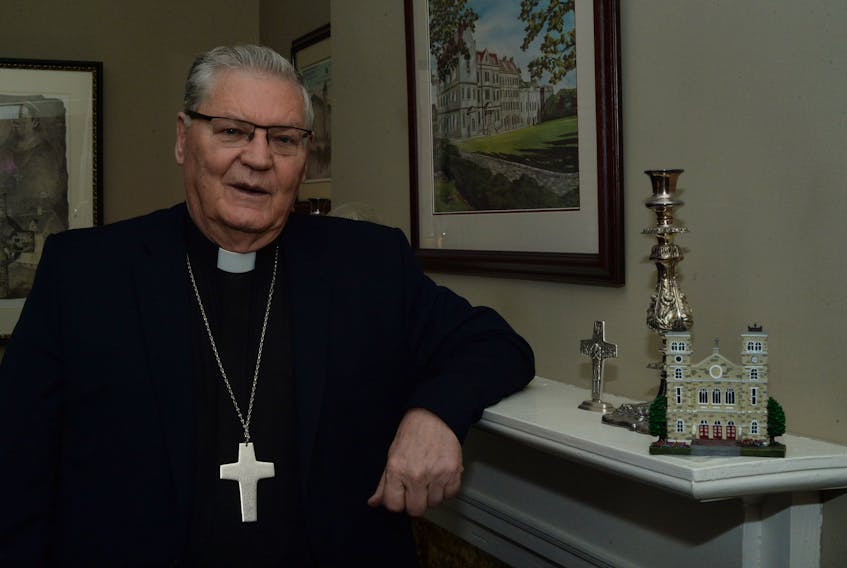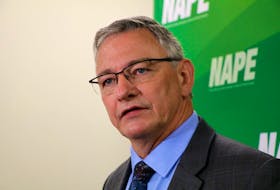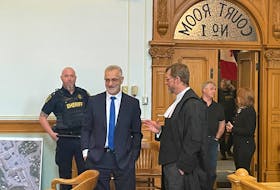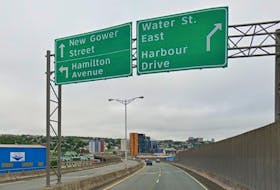There was a counterculture going on around Martin Currie when he was ordained to the Catholic priesthood in the 1960s.
The archbishop of the Archdiocese of St. John’s for the past decade even raised a placard or two as a student at St. Francis Xavier University, and later as a young priest in Halifax protesting to the Nova Scotia government for a new school.
Fifty years on, as Currie prepares to celebrate the anniversary of his ordination in May, and later this year tender his resignation as archbishop, the Catholic Church has seen its own revolution. Rocked by sexual abuse scandals in Newfoundland and Labrador and around the world, with the number of those practising their faith plummeting — due to shifting demographics and religious skepticism, as well as fallout from those scandals — the church is trying to remarket itself as a kinder, gentler version to its parishioners, while attempting to convince the world that it is transparent and no longer tolerates abusers among its ranks.
When Currie graduated from the seminary in 1968, the number of people entering was still strong, though it had slipped from earlier decades.

In 1964, Currie was among a class of 74 from Atlantic Canada to enter Holy Heart Seminary in Halifax. By 1971, that number was down to 19 and the seminary closed, merging into the interfaith Atlantic School of Theology.
In the past 10 years in St. John’s, Currie has ordained just five priests, and only one man — a refugee from the Congo — is currently studying for the priesthood.
Several rural churches have been turned over to their communities, and the archdiocese is grappling with too many churches in the St. John’s metropolitan area. It has hired a consultant to help figure out how to reassign duties at the Palace — the offices adjacent to the church’s St. John’s jewel, the Basilica — where six staff of about 15 have left or are leaving due to age or other opportunities.
Currie admits the church has not kept up with the times, and struggles to get its message out to a new generation hooked on technology.
It will take at least a generation, he says, for the Roman Catholic Church to regain its reputation from the fallout of failing to deal adequately with sexual abuse by priests over many decades.
As archbishop, Currie hoped to resolve all the sexual abuse claims from years ago. There are about a dozen cases left to be settled, but Currie said he doubts they will be through the legal process during his tenure.
“Hopefully, my (successor) will be able to deal with all them. I hope and pray there are no new ones coming forward,” he says.
The sexual and physical abuse that became the horrific legacy of the lay order Christian Brothers-run Mount Cashel Orphanage remains connected to the Catholic Church, if not legally, then certainly in the public consciousness. (A recent civil decision sided in favour of the church over victims from the 1940-1960s who argued the church should be held responsible for the actions of the Brothers, but that decision is being appealed.)
The Catholic Church has been culturally more dominant in Newfoundland and Labrador than in Currie’s native Nova Scotia.
Currie says, growing up in rural Sheet Harbour, for instance, his classmates were split equally between Catholics, Anglicans and Presbyterians.
Before the scandals, in many parts of this province the priest was seen as being next to God, and the church held power and prestige in society. It gained property through donations and bequests for generations, building up massive holdings in places like St. John’s, though much of the property had to be sold in recent decades.
Challenges, such as celibacy
It would be unthinkable in past decades for an archbishop to be as open as Currie is. But he speaks candidly about life as a priest, and would like to see the church allow priests to marry. He says that could happen in time given Pope Francis’ response to those who have asked — requesting feedback rather than shutting the notion down.
“The law of celibacy is only something which could be changed tomorrow. Nothing to do with priesthood, it’s a discipline,” he says.
“Whether it will change, there’s discussion going on that level. It could change.”
It’s a struggle he is familiar with, having some envy of the families that his siblings have built.

He recalls his younger days in Lunenburg.
“I would say mass in Bridgewater and I would drive down to Lunenburg and back around on a Christmas evening. Each place I would go, (the people) would be saying ‘Merry Christmas,’ and wave to me. They would go home with their family and I would go home and sit by the tree by myself. The loneliness of the life sometimes was troubling,” he says.
Of the 14 men he was ordained with, four left the clergy to get married.
“It is a challenge. When I would think that way, I always felt like I had a deep spiritual life and I would take it to the Lord in prayer and that relationship with Him would sustain me,” he says.
A couple of times he thought of leaving the church, after having difficulty with some priests who were his superiors.
By church law, Currie must file his resignation from the archbishop’s position by his 75th birthday in December. The church hierarchy may ask him to stay on until a successor is found.
Currie says he will probably return to Nova Scotia to be near his family and, admitting he’s not much for cooking and cleaning, expects to share accommodation with some other retired priests.
He also plans to spend some quiet time in a monastery to reflect, but wants to travel as well.
Early days
For Currie, the priesthood was not — as was once common — a family vocation. The son of a woodsman, he was the first of the Currie line to graduate from high school and go to university.
After various posts in Nova Scotia, Currie took a mission in Peru, where he says his understanding of God shifted after he witnessed the poverty of the people there.
“We put in some of the infrastructure — churches and water projects,” he says. “This was not God’s fault. This was the fault of the system, the oligarchs of the political system, the military, that they were in this poverty,” he said.
“We worked with people to see they could change, become masters of their destiny.”
An educational sabbatical followed and Currie returned to Nova Scotia, where extensions had to be built onto churches as the fishery boomed and people moved in to work at the Michelin Tire Plant in Bridgewater.
He played hockey, curled and blended in with the community.
In Halifax, he took charge of a newly built church in 1987.

“In those days, I would have 90 people for first communion and confirmation class. All kinds of baptisms, and hardly any funerals and weddings,” he says.
Halfway through his career, he went to Israel for a time, then back to Nova Scotia, where he was appointed a vicar general before becoming archbishop of central Newfoundland in Grand Falls-Windsor in 2001.
In 2007, he was made archbishop of St. John’s while still handling the central archdiocese for three years.
Currie says he has always felt energized by pastoral duties rather than administrative work.
Nowadays, those duties include finding ways to deal with shrinking congregations. Several rural churches were turned over to their communities when they could no longer be sustained by the archdiocese.
“Newfoundlanders are very conscious of their history, so we try to respect that,” Currie said. “People often say, ‘Bishop, we lost the school, we lost the post office, not a gas station or a store anywhere, are you going to take our church, too?’”
The church has also begun a strategic plan for the metro area and hopes the parishes will come to decisions about how to reduce the number of churches.
Over his 50 years in the church, he says, the greatest change has been the increased role of laypeople.
“The laypeople — rather than pray, pay and obey — are asked to become active in the church,” he says, adding that Pope Francis told bishops when they visited the Vatican last spring that the church must become more hospitable.
“Don’t be judgmental, be hospitality. Welcome them with hospitality. … He wants us to be a church of compassion and a church of mercy,” Currie says. “He feels that has been lacking and that will touch people’s lives.”
The afterlife
Currie’s strong personal faith in God includes belief in an afterlife.
He is resolute that God created the Earth and its people, but says science has the answers to how it was accomplished.
“And I believe when my life on Earth is over, I am going to be changed, I am going to be transformed and I am going to live forever in happiness with God. And I am going to live forever with the saints."
— Archbishop Martin Currie
He had a brush with death in 2009, when he was found in his Outer Cove home after failing to show up for mass at the Basilica on New Year’s Day. Then-archdiocese comptroller and business manager Bill Power found him — which created mixed emotions for Currie when Power had to be fired a few years later when the archdiocese was alerted to $500,000 in misappropriated funds by an accounting review.
The experience of surviving carbon monoxide poisoning, while frightening, also moved him.
“When I became conscious again, woke up in intensive care, I was just so grateful there,” he recalls.
“I have devotion to Mary the Mother of God, and I asked Mary to put her arms around me and help me and hold me, and that was kind of life-changing.
“That was a very moving moment when I became conscious of the deeper meaning of life and what is really important. That I love people and care for people is important. … That is what I am going to be judged on.”
‘If only’
You can’t help but wonder, stepping inside the Palace, whether things could have been different for so many people if someone had acted on the knowledge of abuse at Mount Cashel decades before the scandal exploded in the 1980s.
Currie had nothing to do with the actions of those church officials, or with the abusers.
He says the first time he recalls the church having to deal with incidents of abuse was in the early 1990s in Halifax.
Yet there were rumours over the years. The church would send abusers to a rehab facility, along with those with addictions, and then the priests would be declared fit to return to service.
Currie says the church did not realize the extent and the effects of the abuse at first.
“Only when we got into the 1980s we would begin to understand,” he says.

“But now, today, you would never even think of (allowing a priest to return to service.). As we gather a whole body of knowledge — we would just throw away the key. … If we don’t deal with things properly or try to cover them up, my career would be gone.
“We all have our if only, if only, if only.”
Currie has met with a number of victims of clergy abuse in Newfoundland and Labrador, and issued a public apology in civil court.
“That has been one of the things that has been very, very difficult. There haven’t been too many days that I haven’t had the abuse issue somewhere on my desk or in the back of my mind. It’s been very painful and very heart-wrenching for me,” he says.
“To hear their stories, they are adults now. They not only were robbed of their childhood, their adulthood was robbed from them in many ways, too. Because of the ongoing effects, as we learn more about sexual abuse, the tremendous effects it has on people, it was very painful.”
Perhaps the province’s most renegade priest, the priest for Torbay, Flatrock and Pouch Cove — one who freely admits he will never make bishop, Father Paul Lundrigan — admits to having a number of arguments with Currie, some about pushback from the church hierarchy for allowing women to deliver the homily, or sermon.
Lundrigan describes Currie as a “centrist,” much like Pope Francis.
“He’s caught between the old conservative church and the new vision of the church. Unfortunately, they are in a minority,” Lundrigan says.
But he respects Currie, and credits his pastoral background for his strong sense of empathy.
“As angry as I get with the slow pace of things, I have great admiration for him for his tenacity. … I really admire the man. He’s a great bishop.”
The year ahead will be busy for Currie. There will be a special mass and celebration of his ordination anniversary on May 11, and he will join members of the Presentation Sisters on a tour of Ireland for the 300th anniversary of their founder. He will also revisit Peru.
Currie says if he hadn’t chosen a life in the church, he would have liked to have been a broadcast reporter.
However, if he had it to do all over again, he would still enter the priesthood.
“It’s been a good journey,” he says.
Twitter: bsweettweets









